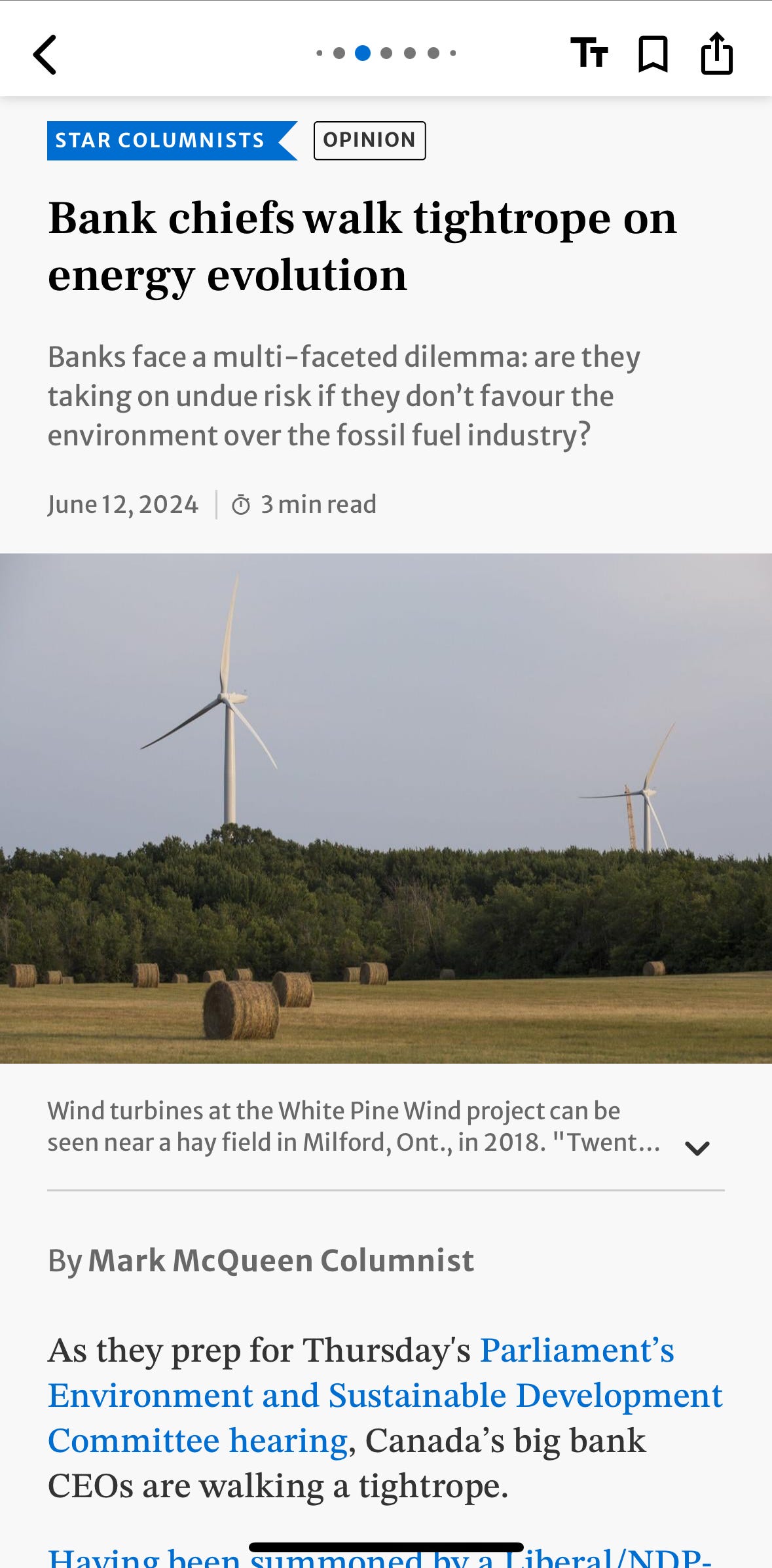Bank chiefs walk tightrope on energy evolution
Banks face a multi-faceted dilemma: are they taking on undue risk if they don’t favour the environment over the fossil fuel industry?
I feel I must apologize to my Substack subscribers for the lack of material of late. I assume that you don’t want to read any more rants about the continued degradation of Canadian values, and now that the nice weather is (sort-of) here, there are weeds to pull and balls to hit. That said, I promise to do better!
Today’s Toronto Star column was meant to help our readers understand just how complicated it is for the CEO of a Canadian bank to appear before the House of Commons Environment and Sustainable Development committee, with a dose of my own research into what the banks have been doing with their oil and gas loan books since 2020. The Parliamentary hearing is about the “climate impacts related to the Canadian Financial System,” and even the title seems presumptive. I expect the Big 5 bank CEOs to handle the Liberal/NDP “are you saving the turtles?” ESG-type questions with ease, but it will be interesting to see what tact they take regarding Conservative MP Branden Leslie’s appropriate curiosity about their support for the oil and gas sector. If we’re lucky, some MP will ask why certain banks aren’t doing more to support Canada’s Clean Tech sector (see prior post “Taking risk can be rewarding, even for a bank” Jan 4-24). As I wrote more than a year ago, new innovation in the Clean Tech space is Canada’s answer to the world’s carbon reduction goals (see prior post “Clean technology advancements, not circular taxes, is Canada's best hope to reduce global greenhouse gasses and grow our economy” May 11-23). But someone has to finance it.
I’ve posted the first half of my latest Star column below; if you want to see how it ends, you have the choice of buying the Wednesday hardcopy, signing up for the $65 (pre-tax rebate) annual digital subscription via the newspaper website, or accessing the piece via your Apple News App.
As they prep for Thursday’s Parliament’s Environment and Sustainable Development Committee hearing, Canada’s big bank CEOs are walking a tightrope.
Having been summoned by a Liberal/NDP-dominated committee to allay concerns about the impact of Canada’s financial system on the environment, one’s instinct will be to regale MPs with five minutes of virtuous stories about how your institution is trying to save the turtles.
Banks certainly have a good story to tell, but given high energy prices, the CEOs may want to avoid painting themselves into the environmentalist’s corner. During an earlier hearing, some MPs tried to determine if our banks had reduced the availability of capital to oil and gas (O&G) companies, which — if true — could eventually lead to higher domestic O&G prices.
Good question.
For more than a decade, bank executives have taken useful steps to shrink their institution’s carbon footprint: new energy efficient headquarters, “green energy” purchases from Bullfrog Power, even cutting electricity use through a reduction in the number of computer monitors at their offices. More recently, they’ve wisely put their sizable balance sheets to work in support of renewable projects, such as wind power and solar farms.
Twenty years ago, a Canadian wind farm developer might have just one door to knock on (Manulife) if it wanted to raise long term debt. Today, “sustainable finance” seems destined to generate more business for Canadian banks than the entire O&G industry.
In the current political and media climate, one can sympathize with bank boards for appointing a “chief sustainability officer” and generating 60-page reports about creating “a more sustainable world.” If Starbucks is going to exit plastic straws, it’s natural that the omnipresent banking sector has wanted to “step up.”
What gets less attention is that global banking regulators have spent the last decade jawboning the financial sector about “Breaking the tragedy on the horizon — climate change and financial stability,” as outlined in a 2015 speech by then-Bank of England Gov. Mark Carney. The same fellow who may well be a leadership candidate for the carbon-hating Liberal party.
Hit the link to read the rest.
MRM
(this post, like all blogs, is an Opinion Piece)





